December 18, 2003
House of Sand and Fog – Movie Review
A Symphony of Colliding Entanglements
By Fred H. Arm
House of Sand and Fog is probably one of the best pictures of our time, yet does not really become obvious until after you have had time to digest the roller coaster of sensations you are drawn into. Vadim Perelman, the first-time director and writer of the screenplay adaptation, is a maestro of storytelling orchestration and visual interplays. The film is like a massive body of water slowly beginning to spin a whirlpool of tragic circumstances into a larger and larger vortex. The piano concerto sound track is alive with crackling tension and conflict spinning a web of incredible intensity and drama. At first one experiences the inertia of the story unfolding too slowly, so characteristic of many foreign movies. You want the film to move along at a faster pace, yet the pull of the vortex and the acting are so powerful, you allow it to carry you reluctantly to its intended finale.
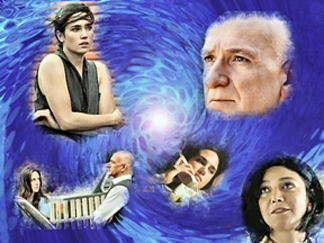
BEN KINGSLEY brilliantly portrays Massoud Amir Behrani, an exiled Iranian Colonel once within the Shah’s inner circle, who lives a lie to fulfill his dreams. Behrani pretends to his family he is successful, when in reality he must hold down two menial jobs just to make ends meet. One fine day he seizes upon an opportunity to purchase a home at a foreclosure sale at bargain basement prices that is similar to his dream bungalow in Iran on the Caspian Sea. The home belongs to Kathy Nicolo, JENNIFER CONNELLY, a lost soul who has neglected to attend to her business affairs thus allowing the County to mistakenly evict her in a tragic unfolding of circumstances.
Nicolo and Behrani are equally intractable, adhering rigidly to their respective positions in a callous and grueling battle of wills that will engender the audience's heartfelt sympathies. Both are equally hampered by intractable financial situations, both are unfortunate victims of coalescing destinies. Which one of the protagonists will prevail? You must see for yourself the surprising and unforgettable conclusion of this nightmarish chronicle.
RON ELDARD (Black Hawk Down) plays Deputy Sheriff Lester Burdon, who tries to take the law into his own hands; SHOHREH AGHDASHLOO as Behrani’s wife Nadi; and JONATHAN AHDOUT as their son Esmail; provide supporting roles that more than enhance the immense acting performances of Kingsley and Connelly.
This movie is a frightening saga rife with a Shakespearean type tragedy precipitated by bureaucratic bungling of the county government. The story explodes profoundly with American realism that clashes rudely with agonizingly raw honesty. It focuses firmly and steadily on the two principle characters, both so radically different in cultural backgrounds and status, however, each ensnared by the not-so-different emotionally challenging situations. From a strictly legal point of view, one can easily challenge and vilify the ineptitude of the heroine and the absurdity of the County, however, that flaw aside, it is immaterial to the beauty and transcendence of this film. Kingsley and Connelly present astounding performances that will not soon be forgotten. This film has Oscar nominations written all over it.
Open December 26th in Bay Area theaters.
December 11, 2003
Big Fish – Movie Review
This Fish Flounders Without The Hook
By Fred H. Arm
When I heard that director Tim Burton (Batman, Edward Scissorhands, Planet of the Apes, Sleepy Hollow) directed this tale, I assumed that an extraordinary saga would unfold on the screen as something unnatural and weird, yet entertaining. Weird it was, yet it often failed to convey a story. Rather it made some attempts at reconciling Edward Bloom’s (Albert Finney as the dying old Bloom and Ewan McGregor as young Bloom) tall yarns he would tell repeatedly to anyone who would listen and especially to his son Will Bloom (Billy Crudup). Will soon learned to disbelieve all of his father’s fantastic stories and ultimately became totally estranged from his father, whether as a result of shame or the lack of intimacy and connection with his father. His mother, the ever-smiling Sandy Bloom (Jessica Lange), lends little of her stellar talents to this wooden role.

The fables as they unfold are truly implausible and often border on the ridiculous. Clearly, one is left with the same mindset as the son Will, that Edward is a huge bullshitter who may have trouble separating fact from fantasy. The story or stories are told in confusing flashbacks, sometimes in a true Tim Burton fantasy and sometimes in what appears to be a vaudeville style. The characters are indeed colorful and weird such as the ringmaster of the Circus Amos (Danny DeVito) and the Colossus (George McArthur). It borrows heavily in fantasy style from other recent fantasies like the Truman Show, Harry Potter, and Lord of the Rings, yet does not come close to telling a story with clarity and style.
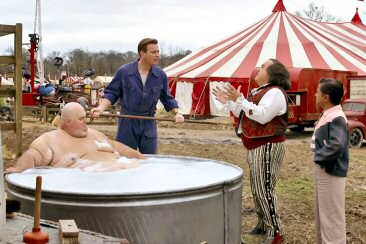
The film jumps from clarity to confusion and back to rationality and clarity. We are touched that the son ultimately appears at his dying father’s bedside and attempts to find out who his father really is. There are many seeing the picture who will be quite taken by its symbolism, fantasy, and fatherly machinations. For myself, this film could have been written in a much more coherent manner and revealing much, much more of the possible intimacy that can exist between father and son. The comedic routines are quite funny and Burton seems to have the timing down quite well. However, its humorous sequences are not enough to carry the film or to carry the story from scene-to-scene.
The ending is predictable early in the film and clichéd at best. Helena Bonham Carter’s talents are wasted as Jenny, the child becoming adult who had her eyes on Edward since he was a young man. She also plays a more interesting role as a witch in this flick, but it also falls flat and gets placed on the shelf with the rest of the cast that have not been adequately developed. This is a picture that you will either love or simple discard as too much weirdness and lacking coherence. Obviously, you know where I stand.
Opens everywhere December 25th in the Bay Area.
Something’s Gotta Give - Movie Review
A Funny, Poignant Tale For All
By Fred H. Arm
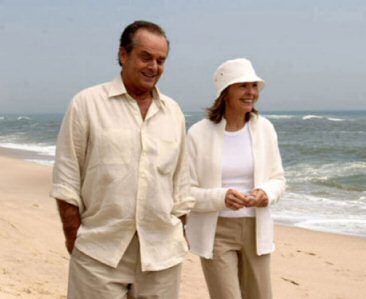
Academy Award® winners Jack Nicholson, Diane Keaton and Frances McDormand star with Keanu Reeves and Amanda Peet in a sophisticated romantic comedy from writer/director Nancy Meyers (What Women Want, The Parent Trap).
Picture an aging, 63 year-old Lothario, Harry (Jack Nicholson) with a libido much younger than his years and his sweet young plaything, Marin (Amanda Peet), on a weekend trip to Marin’s parents beach house for a romantic getaway weekend. Just before their weekend begins, Marin’s mom, Erica (Diana Keaton), a successful playwright, and her sister Zoe (Frances McDormand) arrive unexpectedly to spoil their weekend. After polite urgings by Marin’s mother and sister, Harry reluctantly decides to spend the weekend with the entire entourage. During dinner, Harry shares his passion for dating younger women and that he would never date women his own age. Reluctantly, Erica and her sister more or less accept what is happening and begrudgingly accept the amorous goings on around them.
Marin and Harry start kissing in the other room and Harry passes out from a heart attack. Harry is then rushed to the hospital. Dr. Julian ( Keanu Reeves) tells Harry that he has to stay off his feet and cannot go back to his home in the City until he has improved. Julian then suggests that Harry spends a week at Erica’s home until he is well enough to travel back to the City. Harry and Erica express some reservations, however, Erica and Harry soon find out they are really not so different from each other after all, developing a special relationship and bond together. Once she accepts her situation, she opens up an emotional reservoir within her that affects her more deeply than anything has in years. Harry becomes open to appreciating the appeal of women his own age. As they become more at ease with one another, the dialogue between them becomes crisp, fresh, and revealing of their intimate personas.
At about the very same time, Harry’s 36 year-old charming doctor (Keanu Reeves) makes a play for Erica, while Harry attempts to seduce Erica with his own fading charms. Erica, caught in the middle, is amazed at all the attention placed on her. It is unfortunate that the chemistry between Harry and Erica is not quite as believable and intimate as it seems to be between Erica and Julian, the young thirty-some doctor. I can easily overlook this minor flaw and simply chalk it up to Jack Nicholson’s personal lack of ability to deeply connect to a mature woman other than sexually.
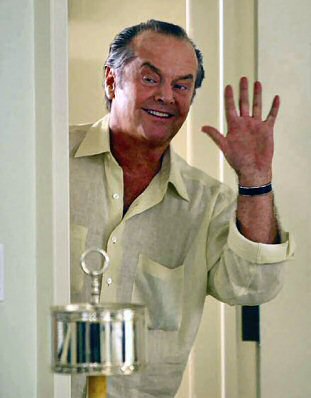
“Something’s Gotta Give” is well crafted with humor, poignancy, and drama. The laughs will keep you rolling in the aisles. The script is smart, fresh, and sophisticated. Jack Nicholson proves once again that he is a superb actor and can play most any type of character flawlessly. Praise is also due to Diane Keaton, portraying probably her best role in years as a delightfully sweet overworked play write. Keanu Reeves, Frances McDormand, and Amanda Peet create perfect supporting roles and are each played with exceptional panache and style.
Accolades are also well deserved for writer/director Nancy Meyers for attempting to challenge the system by making Harry’s object of desire a 57 year-old woman. One does not see enough of that sort of thing these days. This is a film that is juicy from its very first bite and maintains its flavor throughout.
The movie may be a bit predictable at times, however the script was brisk, refreshing, and funny while maintaining just the right mix of comedy and drama. Notwithstanding that the ending was somewhat clichéd, the film itself still ended on a very meaningful note.
It opens December 12th at all theaters in the Bay Area.
December 08, 2003
Movie Review – Mona Lisa Smile
A Trip Down Memory Lane
By Fred H. Arm
Take a free-spirited UC Berkeley graduate, Katherine Watson, JULIA ROBERTS, set in 1953 and give her a new job teaching art history to a bunch of pretentious debutantes at the conservative bastion of Wellesley College for Women near Boston, and you have the makings for some interesting cultural collisions. For dinosaurs like me, this film falls short of meeting such a delicious prospect. The film speaks mainly to young college women in the twenties who were not even a gleam in their daddy’s eyes during this period. Although I attended the screening with a majority of young, twenty-something and seemingly delighted women, being from this period precluded me from sharing their enthusiasm.

In the fifties, despite the academic excellence offered for the education of women, the primary measure of the day was how well the students married rather than to prepare them for professional achievement. Upon her arrival at Wellesley, Katherine Watson declines the apartment provided by the College since it had strict rules against male visitors and she could not have a hot plate. Instead, she finds a room in the home of Nancy Abbey, MARCIA GAY HARDIN, who provides a delightful portrayal of a compulsive and rigid matron bogged down with traditional mores. Unfortunately, the film neglects many ripe opportunities for Nancy to deliver a few comedic sequences with panache and style. Instead the wooden Katherine drags the film along with her “Mona Lisa Smile” that is as tiring and implausible as the plot.
The student leads are introduced in a comparatively licentious dorm atmosphere, suggesting homosexual affiliations abound when this is hardly the case. This sort of open, physical and sexual affection rarely exists on today’s campuses, or anywhere else to such an extreme. Betty Warren, KIRSTEN DUNST, portrays a bitchy soon to be married student who thinks nothing of belittling her comrades to the point of outrage, particularly the chubby Constance Baker, GINNIFER GOODWIN. One scene practically screams for Baker to pummel the bitchy Warren, but leaves us unrequited to grovel in frustration and disappointment.
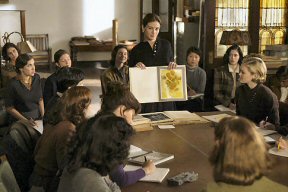 In the opening classroom scene, the know-it-all new students, who each provide a surprising in-depth analysis of the art slides she has projected on the screen, buffet Katherine mercilessly with their snappy answers. In 1953, the students of the time would never disrespect a new professor to that degree, nor would they likely have studied that intensely beforehand, apparently to show up their new teacher. However, to the younger audiences, such ignorance is bliss. Nevertheless, here is another golden opportunity missed by director, Mike Newell for the spirited teacher to nail the students in a humorous way on the spot. Instead, we have to wait for another classroom scene where she retaliates in a lukewarm manner. The effect is almost lame rather than revengefully as satisfying as the setup suggests it could be.
In the opening classroom scene, the know-it-all new students, who each provide a surprising in-depth analysis of the art slides she has projected on the screen, buffet Katherine mercilessly with their snappy answers. In 1953, the students of the time would never disrespect a new professor to that degree, nor would they likely have studied that intensely beforehand, apparently to show up their new teacher. However, to the younger audiences, such ignorance is bliss. Nevertheless, here is another golden opportunity missed by director, Mike Newell for the spirited teacher to nail the students in a humorous way on the spot. Instead, we have to wait for another classroom scene where she retaliates in a lukewarm manner. The effect is almost lame rather than revengefully as satisfying as the setup suggests it could be.
The President of the school, Jocelyn Carr, MARIAN SELDES, is well cast as the stiff defender of chastity and purity of the institution and the standards it sets for its faculty. However, the male lead in the film, Bill Dunbar, DOMINIC WEST, is openly a Bon Vivant who thinks nothing of bedding down members of the willing student body, not even if they are married to someone else. Katherine’s alleged modern persona would never fall for this lecherous gadabout nor would the College have allowed this sort of behavior to continue unchecked. Roberts is miscast in this role as well as West.
The student’s personalities however are more 21st Century rather than from the fifties. Much is crammed into this film in a vain attempt to give it substance, yet one is left feeling flat, that more was needed to make the scenes sparkle with vibrancy. Although there were some interesting nostalgic forays into how women were viewed as only prospective wives and mothers, the story did not have enough power to elevate it from soapy melodrama. Newell’s attempt at subtlety in delivering his actor’s scenes are brilliantly conceived, yet feel much like an exquisitely designed picture frame containing a mediocre painting. For you twenty-something women and nostalgia buffs, this film could be a must see. For those of us who have been there and done that, well--maybe.
Opens everywhere on December 19th.